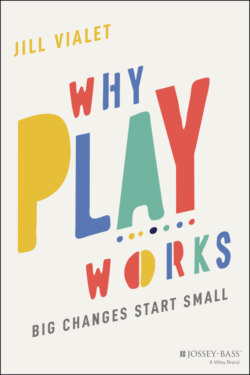Читать книгу Why Play Works - Jill Vialet - Страница 10
The Leagues
ОглавлениеThe Playworks sports leagues were initially launched to prompt greater involvement among girls, but it has evolved over the years to include an assortment of sports available for all students. We also expanded the offerings to include ongoing leagues in the traditional sense, along with weekend extravaganzas that allowed for short‐term competitions. The leagues are also the primary way we involve families and intentionally introduce competition into our programming.
* * *
The results of these efforts when taken together are really quite extraordinary. A randomized control trial—the gold standard of evaluations in which schools were randomized to receive Playworks and the outcomes were measured against comparable schools not engaged with us—found that students at Playworks schools felt safer (according to their teachers), engaged in more vigorous physical activity, were less likely to engage in bullying behaviors, and recovered instructional time with quicker, less fraught transitions.1 Outcomes, it should be noted, that feel particularly relevant to this moment.
Playworks has weathered many storms since its inception, but recent events have left many of us reeling. As of this writing, kids, families and schools across the US are facing incredible challenges: a global pandemic that has closed many of our schools and a social reckoning that has exposed the institutional racism that our country is built on. In summer 2020, in response to school closings, I worked with staff to write The Playworks School Re‐Opening Workbook, which we made available as a free ebook.2 Summer 2020 was also a time of tremendous racial upheaval in the United States, sparked by the murders of George Floyd and others. On the surface, the Re‐Opening Workbook was an effort to offer some tools and a framework for educators to think about how they wanted to come back; however, the writing of it raised a deeper question. Specifically, what might play teach us about doing things differently after schools reopen?
Although play may be the furthest things from our minds when our children's basic education feels threatened, I'm here to say that it is essential for growing kids who are kind and compassionate, able to solve problems, and community oriented. Prioritizing play is critical because these are the very attributes we need for turning things around now and navigating our increasingly complex world.
Play is uniquely well suited to encourage and support human connection. Play has, in fact, survived evolution despite being a “risky” behavior, precisely because it teaches us how to navigate the kind of social connection that is needed right now.
Play also creates many opportunities for redesigning what we want our schools to look like. Considering this moment as a global transition, play offers tremendous lessons for promoting inclusion and belonging. It also makes plain the importance of agency, trust, and their connection to the processes of establishing rules, rituals, and ways of gracefully resolving disagreements. Play teaches us that it matters how it feels, and that focusing on that in school reopenings—for everyone involved—will be critical to our ultimate success.
Writing the Re‐Opening Workbook also reminded me of all the many different people who have been part of the Playworks story. So, in writing this book, I reached out to lots and lots of people: folks who had worked at Sports4Kids in the early days, as well as people who had joined when we had already made the shift to calling ourselves Playworks. I talked with principals who had had our program, to researchers who had studied our program, and to funders who had supported our program. My hope was that in talking to the people who knew us best, I could come to better understand why play works.
This book is the result. The stories and lessons learned from 25 years of bringing play to schools all across the country (and in Ireland as you will read) provide the backbone of this effort to share one profound insight: play has the power to bring out the best in people. This book is not intended to be a history of Playworks, but rather a collection of insights about play that I hope will be inspiring and helpful for anyone who has power or influence over children's access to safe and healthy daily play. My hope is that in reading this book you will come to understand why prioritizing play is so important, not only to the individual child but also to our collective well‐being.
Why Play Works looks at play through our experience as an organization and through our observations as facilitators of play. This book also asks us to reconsider how we have been doing things, and how we might do these things better. The future is uncertain. This book is an effort to inspire and support a shift in our educational system to focus more deeply on teaching the skills that are essential to thriving in a democracy—the abilities to navigate social connection, to have respectful conflict, to learn from mistakes, and to win graciously. It is also a declaration that play is critical to achieving this seismic shift and that big changes start small.
